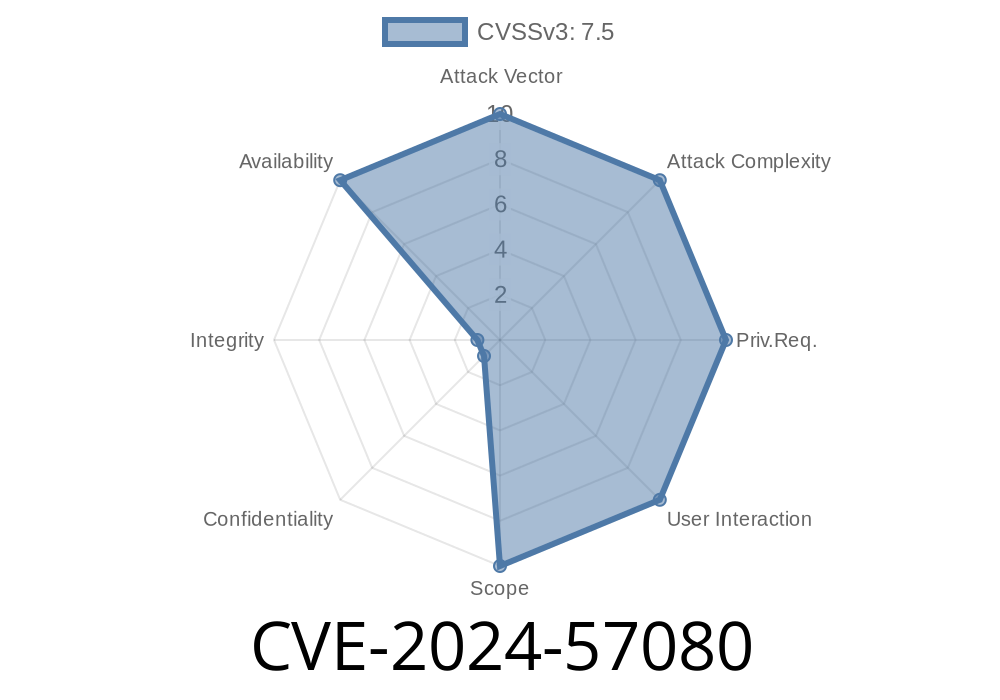CVE-2024-57080 is a recently discovered security flaw in the vxe-table library (version 4.8.10), a popular Vue.js data grid component. This vulnerability is serious—by taking advantage of a prototype pollution in the lib.install function, an attacker can trigger a Denial of Service (DoS) against any app using this package. Let's break down what this means, see the technical details, analyze the exploit, and discuss how to protect your project.
What is Prototype Pollution?
Prototype pollution is a security bug in JavaScript applications or libraries. JavaScript objects inherit properties from their prototype. If a malicious actor manages to inject or modify properties on the prototype, it changes the behavior of all objects which inherit from that prototype. This can cause unexpected errors, application crashes, and, in some instances, even remote code execution.
Vulnerability Description
CVE-2024-57080 exists in lib.install function of vxe-table@4.8.10. The function does not properly sanitize objects received as configuration. By passing a specially crafted payload, an attacker can set critical properties, such as constructor or __proto__, on global prototypes. This triggers application errors or crashes, resulting in a Denial of Service (DoS).
Here’s a simplified look at the vulnerable code
// vxe-table@4.8.10 (simplified)
function install(app, options) {
for (let key in options) {
app[key] = options[key]; // <-- does not check for __proto__, constructor, etc.
}
}
The options object is taken at face value. If someone passes {__proto__: {polluted: true}}, this sets Object.prototype.polluted to true for all objects globally. In Node.js and browser environments, this can introduce dangerous new properties and raise exceptions everywhere.
Exploit Example
An attacker can exploit this bug by supplying a payload during initialization or in any API that wraps around install.
const vxeTable = require('vxe-table');
const Vue = require('vue');
// This object pollutes the Object prototype
const maliciousOptions = JSON.parse('{"__proto__": {"polluted": "YES"}}');
vxeTable.install(Vue, maliciousOptions);
console.log({}.polluted); // Output: YES
// Other modules or objects checking polluted would now fail or misbehave
This payload makes every object in your app have a polluted property, and can break code depending on safety checks—often causing crashes.
Impact & Attack Scenarios
- Denial of Service (DoS): A polluted prototype could result in endless exceptions or broken logic.
- Remote attack possible: If your server or client webapp lets users supply configuration or options (even indirectly, like via imported JSON), they can attack you.
- Supply Chain Risk: Code reused across multiple projects or in npm packages could propagate this vulnerability.
How to Fix
Upgrade to the latest version of vxe-table (if available), where input is sanitized. As a temporary workaround, you can deep clone and sanitize all option objects passed to install, and explicitly block dangerous property names.
Example patch
function isSafeKey(key) {
return !['__proto__', 'constructor', 'prototype'].includes(key);
}
function safeInstall(app, options) {
for (let key in options) {
if (isSafeKey(key)) {
app[key] = options[key];
}
}
}
References
- NVD - CVE-2024-57080
- vxe-table GitHub Repository
- OWASP - Prototype Pollution
Conclusion
CVE-2024-57080 shows how a small oversight in input validation can lead to wide-ranging attacks in JavaScript libraries. If you use vxe-table, update as soon as possible and check for prototype pollution vulnerabilities in all your code. Stay safe!
> *This post is exclusive, written for quick understanding and action for all developers using vxe-table or similar Vue component libraries.*
Timeline
Published on: 02/05/2025 22:15:32 UTC
Last modified on: 02/06/2025 17:15:19 UTC
